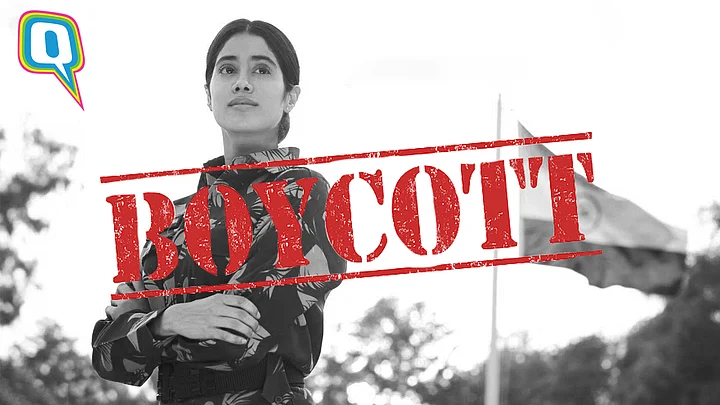Ever since the trailer for Gunjan Saxena: The Kargil Girl dropped on 31 July, a bunch of people have been busy calling for a boycott of the film. This isn't new. It has happened to Padmaavat and countless other films in the past. It's the same chaos, just different reasons. The only consistent fallacy that connects these incidents is the reasoning backing such 'boycotts.' So here's me using logic to try and reason out with the trolls.
1. This might come as a shock to some people..
But Gunjan Saxena has already made all the money it had to. That's just how the OTT business works. In case of a theatrical release, direct ticket sales are a part of the total revenue and matter. But every time you stream a film, the producers don't actually make money becuase the rights to the film have already been bought by the OTT platform. Additionally, Gunjan Saxena has also benefitted immensely from sale of satellite rights to Zee studios.
Toh boycott karke kya milega? Profit toh ban gaya.
Even if you don't watch the film and choose to give "no viewership" to Netflix, you've already paid for the subscription, remember?
2. Suprise, surprise! Karan Johar and Janhvi Kapoor are not the only ones who worked on the film
Making a film is, at the end of the day, a collaborative effort. Sure, judging by the way marketing in the modern world works, an actor or a producer or a director might be the face of it. But it's the efforts of countless other people (casting director, junior artists, makeup artists, costume designers, music composer, cameraperson etc.) that actually make the film.
So when we boycott a film because of one person (which has happened several times in the past), we are negating the efforts everyone else who worked on it.
Is that fair? I don't think so.
3. Gunjan Saxena's story > nepotism & Janhvi Kapoor
In case you didn't get the memo, Gunjan Saxena's story is one of a kind. She was the only female pilot to have participated in the Kargil war, at a time when the idea of women entering the armed forces was almost unthinkable. It's a story that, in a way, defines India and people deserve to know. Gunjan Saxena's story is bigger than Janhvi Kapoor or Karan Johar or Dharma Productions.
By looking at just the trailer, one can tell that Janhvi has put considerable effort into getting into the skin of the character. Does she not deserve a chance just because of her surname?
4. Speaking of supporting 'outsiders'
Ever since this whole 'nepotism' debate caught on, Karan Johar's Dharma Productions is being attacked left, right and centre for gatekeeping by only promoting the so-called 'insiders' of the industry.
But I think people sometimes forget that for every 'insider' who might be the face of a big budget Bollywood film, there are also several 'outsiders' getting the opportunity to perform as well.
Take Gunjan Saxena for instance: Pankaj Tripathi, Angad Bedi, Manav Vij, Vineet Kumar Singh - they are all outsiders. If not for Janhvi Kapoor, watching for these outsiders maybe?
5. Is boycotting the only answer to systemic problems?
Even if one is of the opinion that nepotism in Bollywood is to blame for all its toxicity and gatekeeping, is boycotting the only way to deal with it? Nepotism is an industry-wide phenomenon and tackling it is not as simple as just boycotting one production house or one actor or one film, no matter how powerful they may seem. Real change always comes from conscious dialogue and understanding of the situation from a grassroots level.
6. What is the purpose of boycotting?
Even if one vehemently believes in this form of resistance, it's important to think of why the 'boycotting' is necessary in the first place. The uproar against Gunjan Saxena: The Kargil Girl has been anything but sensible and I'm not the one saying this - it's all over social media.
Just take a look at this tweet which asks people to boycott all Bollywood films? Um, what?
(At The Quint, we question everything. Play an active role in shaping our journalism by becoming a member today.)
